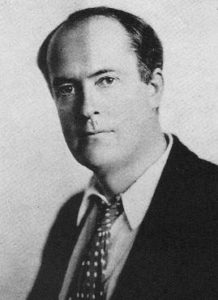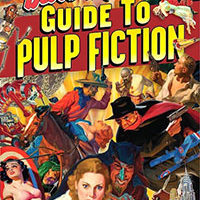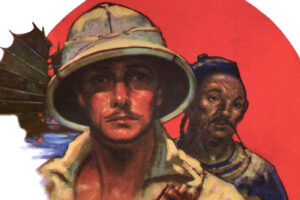
A name that I would hear when I got into pulp fiction was that of Talbot Mundy. What little I recall was that he was an author of great adventure tales set in Asia, some with a mystic element.
While I have yet to read his works, I have been gathering information on him as I work to obtain some of his stories. His most well-known works are King of the Kyber Rifles, and his Tros of Samothrace and JimGrim series.
Talbot Mundy was what might be called a “rogue.” Born in England as William Lancaster Gribbon in 1879, he attended college but didn’t graduate. He went overseas, living and working in British India and East Africa. He did a variety of work, some a little on the shady side. He also at times took on other names, and apparently used them fraudulently. And he had several wives (though not at the same time). “Talbot Mundy”, the name he would legal change to, was based on one of these aliases, one he took to claim a connection to a noble family.
Moving to the United States, he started to write adventure stores based on his experiences for several pulp magazines, especially Adventure, but also Argosy, Cavalier, and others. Among his first novels include Rung Ho! and King of the Kyber Rifles.
Many of his works, both short stories and novels, used and re-used a group of characters, which interconnects many of this works set in the Middle East and nearby lands. One of the first of these is Yasmini who appeared first in The Winds of the World, and later appeared in King of the Kyber Rifles.
Mundy got involved with Christian Science, and this took him to Palestine for a period of time (his first introduction to this area of the world). Coming back to the U.S., he then got involved in Theosophy, which would have a more profound influence on his work. He wrote several works explicitly influenced by Theosophy, especially Om: The Secret of Abhor Valley.
In 1921, using his experiences in Palestine, he created a new character who would appear in many of his works: James Schuyler Grim, or “Jimgrim.” Jimgrim was an American recruited by the British because of his knowledge of Arabs. And these early stories are set in Palestine and the Middle East. At first he worked for the British, but in one of the stories in 1922, he left the British to team up with two of his associates in their own endeavor. They would then be engaged by Meldrum Strange, one of the world’s wealthiest men, in fighting international criminals. Also, as Mundy got interested in Theosophy and other esoteric topics, these made their way into the Jimgrim stories and others, and take him and others in the stories to Egypt and even Tibet.
Mundy also got into historical fiction with his Tros of Samothrace series, which is about Tros, who fights against Julius Caesar. The novels were collected into three books: Tros of Samothrace (1925), Queen Cleopatra (1929), and Purple Pirate (1935).
Interestingly, Mundy kind of killed off Jimgrim in the last novel, though he said he could bring him back if he wanted to. Toward the end of his life he was writing scripts for the radio show Jack Armstrong, All American Boy. I wonder how much of those stories reflect the elements of his other works?
Jimgrim works in book form:
- Jimgrim and Allah’s Peace (1921)
- The Seventeen Thieves of El-Kalil (1922)
- The Lion of Petra (1922)
- The Woman Ayisha (1922)
- Affair in Araby/The King in Check (1922)
- The Lost Trooper (1922)
- Jimgrim, Moses, and Mrs. Aintree (1922)
- The Mystery of Khufu’s Tomb (Khufu’s Real Tomb) (1922)
- The Nine Unknown (1923)
- The Hundred Days (Mohammad’s Tooth) (1923)
- The Devil’s Guard (Ramsden) (1926)
- Jimgrim (King of the World; Jimgrim Sahib) (1930)
Mundy would pass away in 1940, survived by his fifth (and final) wife.
Two excellent works on Mundy are Talbot Mundy: Messenger of Destiny by Donald Grant, and The Last Adventurer: The Life of Talbot Mundy by Peter Berresford Ellis. Both were published by Donald Grant in the mid-1980s.
More recently, Brian Taves wrote Talbot Mundy, Philosopher of Adventure (2005), a biography of Mundy that looks at his philosophical outlook. It also has a bibliography of his works. I’ve not seen it, but it sounds good.
I found that while his early works on in the public domain, his later works are not (from 1923 and afterwards), and this makes it hard to get those as no one seems interested in republishing this. Seems like the last publisher of some of his later works was Avon back in the ’60s.
Black Dog Books is doing the Talbot Mundy Library with his early works. They plan for eight volumes, of which volumes 1, 3, 4, and 7 are out.
As I start delving into his works I post further on the specific works I read. I encourage others to check out Mundy as well.
[updated]



I read as many of Mundy’s books as I could find in the ’60s and ’70s. Darn good stuff. I liked H. Rider Haggard’s writings a little better though. Not too many mention his name any more.
I’ve enjoyed many of Mundy’s novels. I was interested to hear that Black Dog is publishing some of his early novels.